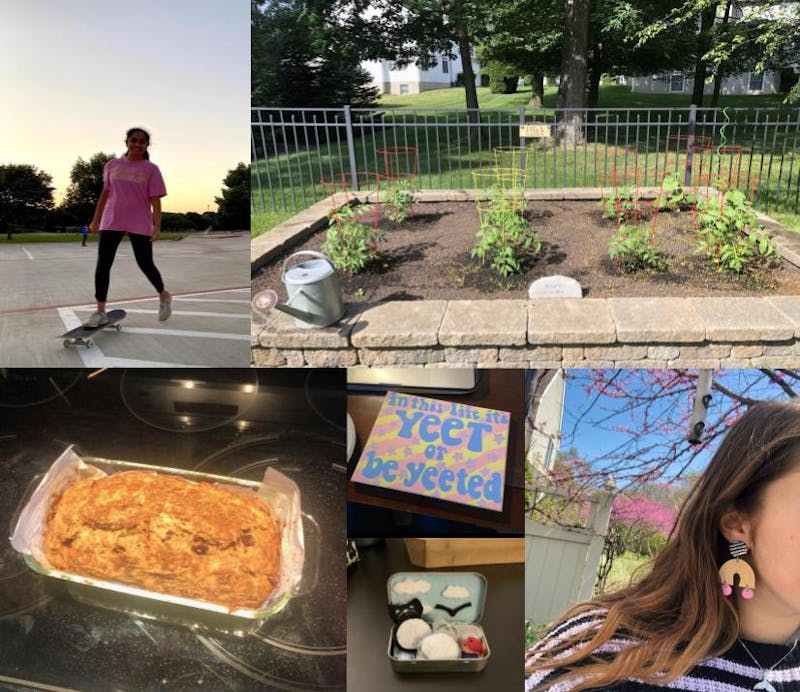
COURTESY OF ELLE GRANT
Over the course of the pandemic, Grant has noticed people revert to Austen-like hobbies such as baking, walking and gardening.

COURTESY OF ELLE GRANT
Over the course of the pandemic, Grant has noticed people revert to Austen-like hobbies such as baking, walking and gardening.
Three Jane Austen novels deep into quarantine, I found the pattern. I glanced out of my bedroom window, situated at the front of my house facing the street, then back to my copy of (the extremely underrated) Mansfield Park and back again. In quarantine, one of the first things I noticed upon returning home to my locked down state were the walkers. I have lived in the same neighborhood and stared out that front window all my life, but the pandemic brought with it an entirely new view. At any given point during the day, a flood of people walked by, usually ones I had genuinely never seen before.
One sunny day in late spring, the walkers were out in their usual droves. But in my novel, I had paused at a point when the Mansfield crew were out on their own walk, and I experienced an aggressive consolidation of fiction and reality. I realized that we weren’t living in the End Times (okay, maybe) but in the Austen times.
The first sign was undoubtedly the sourdough. Splayed all across social media were valiant attempts at homemade bread — some tremendous successes, equally entertaining were the failures. “Sorry,” a girl said in my Zoom French class, “That’s my bread dinging,” as she dashed off screen. My dad and I, who have always been active gardeners, made our way to our local nursery for our yearly haul of seedlings only to find them essentially sold out. The owner, the kind of giddy only a pleasant shock induces, informed us that everyone had suddenly wanted to grow tomatoes or strawberries and turn their black thumbs green. He’d never seen such a demand in his 30 years. My dad and I crankily bought the remaining tomatoes and went on our way.
In what may be a cry for help or an ostentatious exploration of joy, people have gone full-blown Victorian. Baking from scratch and gardening, yes, but also flower-pressing, scrapbooking, practicing instruments long set aside, sewing, playing board games, knitting and of course, walking. The pastimes of wealthy English society women during the 1800s have somehow become lifelines for a bunch of stressed millennials suffering under a pandemic. Perhaps even more bizarrely, they seem to work. My family discovered a borderline concerning adoration for puzzles. As hobbies in the traditional sense, they have soothed and brought happiness to a frazzled populace.
Austen novels have retained their appeal for many reasons, but what I’d argue is particularly relevant now is the window they provide into this upper-class world and the way they romanticize free time. The first time I read Emma, I was knee deep in my sophomore fall. I had about 10,000 assignments, due dates, club meetings, job applications, social gatherings and other bits and bobs to attend to. God, I thought to myself. If only I had the free time to walk around the park and attend tea and meddle in other people’s lives.
The swift and decisive arrival of quarantine the following semester brought with it copious amounts of free time, the likes of which I’ve never known. I learned that I, too, can walk around my neighborhood in pointless circles. And you know what, Jane, I get it. It is relaxing. I do like to look at trees and wave to my neighbors and contemplate life.
All this to say no one has thrown their internet router out the window nor suddenly found an affection for corsets. The hobbies of the 21st century have been on full display during this time as well. Streaming services laugh in the faces of their Hollywood counterparts. TikTok shows that comedy did not die with Vine in a rise that has been nothing short of meteoritic. Even Among Us, which will certainly be used to carbon date the current moment, represents 21st century entertainment.
I realized this myself, seven consecutive episodes deep into Itaewon Class early on during the pandemic (my other recommendations from generous amounts of television watching include Derry Girls, The Crown, Avatar the Last Airbender and The Last Dance). Despite calls to use our new leisure time well, Netflix still has us all in their grips. Yet it isn’t necessarily a bad thing. While calls to rebel against screen time and unproductivity plagued the earlier months of the pandemic stateside, there is something undeniably soothing about watching a good show with a tub of ice cream. It is a decidedly 21st century pastime but also a decidedly good one.
Joy is notoriously fickle, especially in the context of a world plagued day after day by illness, inequality and overall chaos. Joy, in spite of or maybe because of this, can be fleeting, meticulously planned and executed or can even sneak up on you in the most unexpected moments. Hobbies bring me all of these kinds of joy. They provide me with a way to step outside of myself and allow me to subtly flip off a pandemic.
The world has changed, permanently so, but it is still a world in which happiness is more than possible moment to moment. Pumpkin bread and scrapbooking and Claire Foy aren’t making the world a better place, but they’ve made my own one, which I feel should count for something. And there is, always and forever, Austen, whose perennially adored novels have found a new message after 200 years or so: Take a walk.